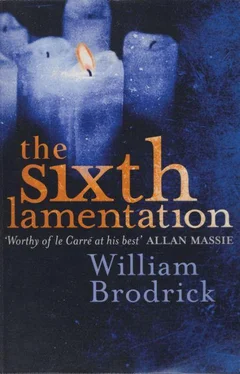William Brodrick - The Sixth Lamentation
Здесь есть возможность читать онлайн «William Brodrick - The Sixth Lamentation» весь текст электронной книги совершенно бесплатно (целиком полную версию без сокращений). В некоторых случаях можно слушать аудио, скачать через торрент в формате fb2 и присутствует краткое содержание. Жанр: Триллер, на английском языке. Описание произведения, (предисловие) а так же отзывы посетителей доступны на портале библиотеки ЛибКат.
- Название:The Sixth Lamentation
- Автор:
- Жанр:
- Год:неизвестен
- ISBN:нет данных
- Рейтинг книги:5 / 5. Голосов: 1
-
Избранное:Добавить в избранное
- Отзывы:
-
Ваша оценка:
- 100
- 1
- 2
- 3
- 4
- 5
The Sixth Lamentation: краткое содержание, описание и аннотация
Предлагаем к чтению аннотацию, описание, краткое содержание или предисловие (зависит от того, что написал сам автор книги «The Sixth Lamentation»). Если вы не нашли необходимую информацию о книге — напишите в комментариях, мы постараемся отыскать её.
The Sixth Lamentation — читать онлайн бесплатно полную книгу (весь текст) целиком
Ниже представлен текст книги, разбитый по страницам. Система сохранения места последней прочитанной страницы, позволяет с удобством читать онлайн бесплатно книгу «The Sixth Lamentation», без необходимости каждый раз заново искать на чём Вы остановились. Поставьте закладку, и сможете в любой момент перейти на страницу, на которой закончили чтение.
Интервал:
Закладка:
It was a slightly odd experience. On leaving the Court of Appeal one late November afternoon, he was stopped in his tracks by a Chinese tourist who never ceased to smile. Several gesticulations later Anselm stood beneath the portal arch of the Royal Courts of Justice looking into the camera of a total stranger.
Suddenly he felt the urge to put the record straight, to say:
‘Look, you’re mistaken. I’m not who or what you think I am; I’m a fraud.’ This happy man from a faraway place had pushed an internal door ajar and Anselm knew at once what was on the other side. He set off down the steps with incomprehensible protestations ringing in his ears — from himself and from the tourist who’d inadvertently nudged him away from the Bar. Taking the bus to Victoria, Anselm walked past the bookshop and into Westminster Cathedral, where he sat down beneath the dark interlocking bricks of the nave and prayed. It was to be the only moment of near certainty in Anselm’s subsequent religious life. The jostling between doubt and perseverance was to come later. But at that time he understood, at last, what the underlying problem had been. It had been Larkwood Priory all along.
Chapter Two
1
Lucy Embleton made a stab at the washing-up and then took the tube to Brixton, knowing her grandmother would do them again. They’d cleaned out all the beans and even squabbled over the cold ones lying limp in the sieve. It was macabre, for Agnes would soon be gone, and eating had suddenly become a singularly futile activity. Waving goodbye, Lucy sensed every gesture now had another meaning that each of them would recognise, but never articulate, shaped by the torpid proximity of death. Her spirits sank into a chilling silence: a part of her past was almost complete and she’d never even understood it.
Lucy was twenty-five years old and had spent a large proportion of that time trying to understand her family’s winning ways. She had never been able to locate any particular moment of crisis within the family history that might account for the present entanglement. It was more of a cumulative happening constructed out of tiny, otherwise insignificant building blocks tightly pressed together and cemented over time. As a child she asked penetrating questions borne of innocence; she guarded the answers with such care that, when she was older, confidences rained upon her — but never from Agnes or Arthur. Lucy became the one in whom the different facets of the past had been consigned, as if she was the one to bring them all together. And from that privileged position she concluded that if there was a simple explanation for what her father called ‘the mess’, it lay in the war years.
The received history was as follows: Agnes was half French, half English, and had lived in Paris during the Occupation. She was there when the black shroud from burning oil reserves hung over the city. She saw the German troops taking photos of ‘La Marseillaise’ on the Arc de Triomphe. She heard the thin, high voice of Marshal Petain say he made a gift of himself to France, that he would seek an armistice with Hitler. About this period she was able to talk. It was the time after that had to be handled carefully, if at all. As a child, Lucy was small enough to inch under the fencing with her curiosity, moving from one month to the next, into the following years. But always the details from her grandmother became sparer, begrudging; her mood increasingly unsettled, her replies sharper, until Lucy learned she was approaching the place of shadows where she could go no further: where, as Freddie once spat out to his burning shame, Agnes became ‘La Muette’: the dumb one.
Of course the family knew what lay beyond the wire. A town and a village: Auschwitz and Ravensbruck. As to the why and wherefore, that was a mystery. Susan often said that only Grandpa Arthur knew where she’d been and why, but Lucy, as usual, moved as close to the line as possible trying to find out.
‘No, I was never in the Resistance,’ Agnes said wearily to one of Lucy’s unremitting schoolgirl questions.
‘Did you know anyone who was?’
‘Yes, I did.’
‘So you were involved with them?’
‘Not really I was just on the edge.’
‘Were they brave?’
‘Very brave. ‘
‘So you must have edged towards bravery?’
Agnes became very still, distracted. ‘We were all so young, so very young.
‘So you did do something?’ pressed Lucy, eating chocolate.
‘Nothing much to write home about. Now, stop your questions.’
That was usually where the probing ceased. But this time Lucy chanced her arm, pushed into the place of shadows: ‘You can’t have a big secret and not tell us what happened.’
Agnes gave a low animal growl through bared teeth. ‘Enough.’
It was Lucy’s first experience of atavistic fear. She became scared of her own grandmother. For Freddie, who was sitting in the corner, watching over a collapsed newspaper, it was simply another example of his mother’s hopelessly introspective temperament. But Lucy, aged fourteen, still possessed the awesome non-rational percipience of childhood, and was young enough to be acutely sensitive to something neither she nor anyone else could name or know It was that which made her shrink instinctively back: a smell on the wind.
So the reason for arrest and what had happened during two and a half years of incarceration lay out of reach.’ The narrative trail resumed, through Lucy’s persistence, at the moment of Agnes’ release, as if nothing had gone before: ‘A Russian soldier stood gawping at me. He was no more than a boy, and his gun looked like a battered toy He couldn’t say anything. I couldn’t speak.’ I was standing with children on either side. He cried.’ We just watched him.’ Eventually he said in English, “You’re free now.”‘
Agnes wearily passed a blue-veined hand through her grey hair, rearranging a silver clip, and added, ‘I got out of Babylon, but there was no Zion. No promised land.’
‘What’s that, Gran?’ Lucy enquired, puzzled.
‘Just an old song about homesickness. And hope.’
‘By Boney M?’
‘A psalm.’
It was an opaque exchange, and all the more peculiar because Agnes was not a religious woman.’
After the war Agnes returned to Paris where she met Captain Arthur Embleton in a hospital. They were married within two months, staying on in France for the next couple of years, during which time they had twins: Freddie and Elodie. After leaving the army Grandpa Arthur brought the family back to a suburban existence in north London.’ He became a solicitor in a large London firm and their life was superficially comfortable and predictable, except for those who knew otherwise. After Lucy’s unnerving exchange with her grandmother, Freddie told Lucy about his own inexplicable childhood memories.
At times Agnes was captivating and extrovert, Freddie explained, but could suddenly and for no apparent reason become swamped by abstraction.’ It was as if the apparatus of her personality shut down, like a vast generator losing its source of power. The life in her would drain away until all the lights blinked and flickered before going out. And then she was gone, even though she was still in the same room, and everyone else was left adrift and awkward, trying to make contact across the space left by her absence.
This was the kind of thing Grandpa Arthur called ‘a tactical withdrawal from the field of conflict’, which was his thin attempt to joke with the children. But it also named a truth. Ordinary life was a battle for Agnes. Lucy’s father also remembered those frightening moments: when Agnes suddenly froze, as if gripped by vertigo, shaking and sweating, holding on to the rim of the sink, the edge of a table, the back of a chair, until talked down by Grandpa Arthur.
Читать дальшеИнтервал:
Закладка:
Похожие книги на «The Sixth Lamentation»
Представляем Вашему вниманию похожие книги на «The Sixth Lamentation» списком для выбора. Мы отобрали схожую по названию и смыслу литературу в надежде предоставить читателям больше вариантов отыскать новые, интересные, ещё непрочитанные произведения.
Обсуждение, отзывы о книге «The Sixth Lamentation» и просто собственные мнения читателей. Оставьте ваши комментарии, напишите, что Вы думаете о произведении, его смысле или главных героях. Укажите что конкретно понравилось, а что нет, и почему Вы так считаете.












